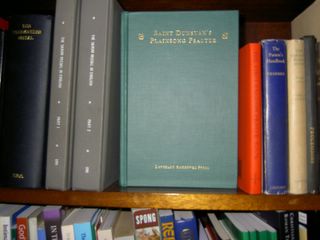
O sing unto the Lord a new song; let the congregation of saints praise him. Let Israel rejoice in him that made him, and let the children of Sion be joyful in their King. - Psalm 149: 1&2
This arrived in the post on Wednesday - a birthday present from a very good friend to whom I had mentioned a desire to have this in passing some weeks earlier.
It is an absolutely wonderful asset, which now enables me to sing the Office properly, and offers some translations to the Marian antiphons which are really easy on the ear. I enjoy metrical paraphrases to some degree, but a translation that fits the plainsong is far preferable.
I also love the fact that the Chapters and Nunc Dimittis antiphon from Compline have been provided. I feel somehow more complete now that I have this, and I am very grateful for it. It even has psalm 151!
I may even persuade my parish priest to use plainsong for Evensong one evening, as I have the organ accompaniment to the Sarum tones (courtesy of The St. Mary's Press, Wantage).
There are one or two things that stand out as a little odd, though. Firstly, in the introduction, we are told that 'These days, the pious will search far and wide' for The Plainsong Psalter and The Sarum Psalter of G H Palmer as though they are rare books. While it is true that the former has been out of print since 1960, the latter is, in fact, still in print. I bought a new copy from the sisters at Wantage last summer.
I can understand some of the collects and versicles and responses having been altered to refer to the state and the president instead of the Queen, as it is an American publication, but was the following really necessary?
From Evensong:
V/ Give peace in our time, O Lord.
R/ Because there is none other that fighteth for us, but only thou, O God.
has been changed to:
V/ Give peace in our time, O Lord.
R/ For it is thou Lord only that makest us dwell in safety.
I don't understand the reason for this change to one of the most emotive responses in this particular office.
That's the only thing that really bugs me, but as I prefer Vespers anyway, it won't be a problem. All in all, it's a fantastic publication, and I recommend it to anybody who is serious about singing the Office.
Isn't that the same as in the English 1928 BCP? I think so, but haven't mine to hand. I shall check, though. I rather prefer it to be honest.
ReplyDeleteRichard
Well, the faithful outside of the UK definitely search far and wide for things like the Sarum Psalter. The Wantage sisters may have it in print (in which case, Deo gratias), but how would anyone know about it? Anyhow, thanks for the nice review of S. Dunstan's Plainsong Psalter!
ReplyDeleteAlso, the difference in the Suffrages is a difference between the English and American Prayer Books. I don't quite remember why the American version is different. When we were putting the Psalter together, we thought about (but somehow forgot) to put in a supplemental set of Suffrages for subjects of the Queen ("O Lord, save the Queen"). Maybe in the next edition!
ReplyDeleteThank you, both of you.
ReplyDeleteI hadn't realised, Benjamin, that you had played a part in the compilation and publication. Thank you for it.
I see what you mean about knowing about the Palmer Psalter's availability. I came to know of it as I contacted the Convent following the direction in the English Hymnal to them for the music for the Mass Propers. They sent me their catalogue, and I ordered a fair bit of stuff from them: the Plainchant Gradual, the Book of Introits, the Exultet, the Sarum Psalter, music for the Sarum tones, and all sorts amounting to about £80. It was my 21st birthday present to myself, and most of it has come in very handy over the past year. It has also greatly enhanced my plainsong-singing capabilities, as I don't get to sing it much liturgically.
The suffrages and collect aren't a problem, to be honest. I should imagine that anybody from this side of the pond would know to substitute 'Queen' in that response, and the suitable words for them to use in the the collect for the Queen.
Thank you as well for pointing out where the difference comes from. I still prefer 'for there is none othet that fighteth', but that may be partly because that is what I have always known rather than anything more objective.
Congratulations as well on your recent graduation. I commented on your blog, but things seem to have slowed down across the board in the blogging world lately, and so I'm not sure if you came across it. Well done.
We use the St Dunstans frequently at our St Brendan's Mission. I have emailed the sisters at St Mary's Wantage in hope of purchasing more material.
ReplyDelete